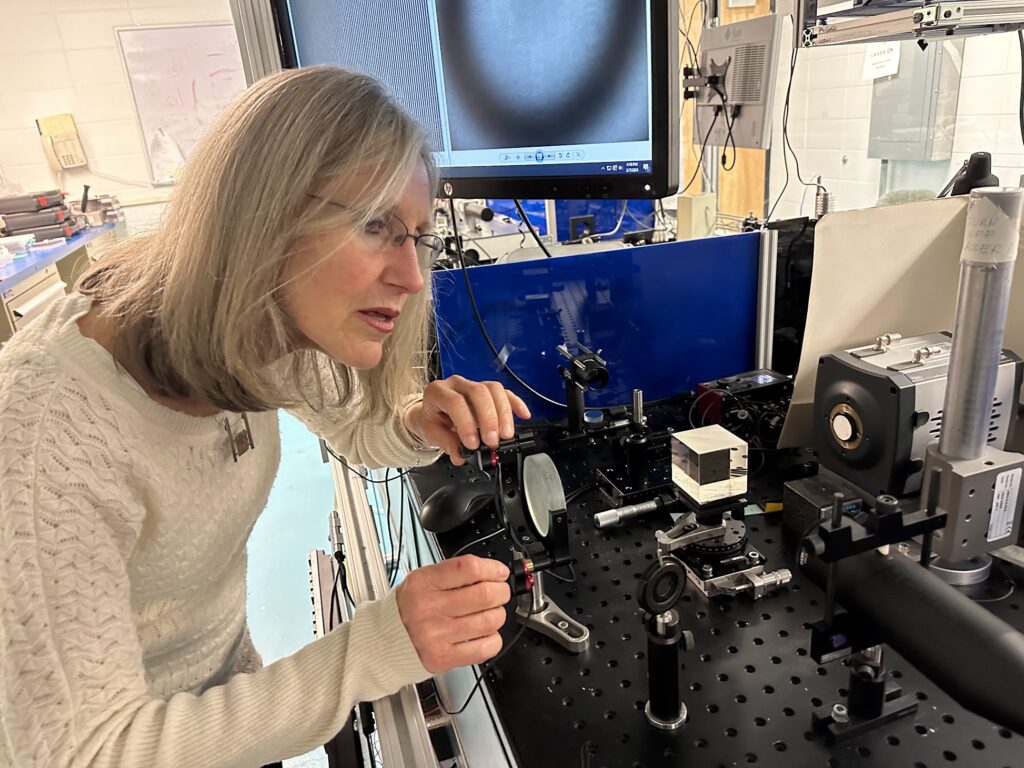
Carmen Menoni, University Distinguished Professor of Electrical and Computer Engineering, has received the prestigious Joseph Fraunhofer Award/Robert M. Burley Prize from Optica, formerly known as the Optical Society of America, the society recently announced.
The award recognizes Menoni for her research accomplishments in optics, a field that advances the science of light to drive innovation.
Building on CSU’s reputation for excellence in lasers and optics, Menoni’s recognition follows two other significant awards for her pioneering contributions to the field.
As the director of the recently established Inertial Fusion Energy hub, known as RISE, Menoni is developing novel optical coatings to propel laser-driven fusion energy, a potentially inexhaustible source of clean energy.
Her laser coating technology is also a key tool in the development of the petawatt-class laser system that will be housed in CSU’s new $150 million laser facility through the recently announced public-private partnership with Marvel Fusion.
Game-changing materials
Menoni received the honor “for seminal contributions to the materials aspects and engineering of amorphous oxides for optical coatings of high intensity lasers and gravitational wave detectors.”
Building on two decades of materials research, Menoni’s group is pushing the frontiers in dielectric coatings to enable future breakthroughs in laser science.
Through her leadership of the RISE hub, funded by the Department of Energy IFE-STAR program, Menoni is developing optical coatings for a new generation of high-power lasers to make commercial fusion a reality. Her mirror coating technology is also helping the Nobel-winning Laser Interferometer Gravitational Wave Observatory team, known as LIGO, extend its reach into the cosmos.
“Carmen is an internationally known expert in the fabrication of thin-film optical components,” said Martin Fejer, professor of Physics and director of the LIGO Center for Coatings Research at Stanford University.
Menoni uses materials grown in the lab to create thin film stacks of transparent glasses that reflect light like a mirror. Designed to withstand extreme conditions, the thin film coatings are responsible for reflecting laser beams in high power laser systems and interferometers – the instruments used to detect large-scale cosmic events.
A bright career

As a CSU alumna and the first in her family to go to college, Menoni built her career from the ground up at Colorado State University. Shortly after earning her Ph.D. in Physics from CSU in 1987, she joined the faculty in the Department of Electrical and Computer Engineering in the Walter Scott, Jr. College of Engineering.
Menoni is among the less than one percent of CSU faculty who hold the title of University Distinguished Professor, the highest academic recognition on campus. She holds courtesy appointments in the Department of Chemistry and Schools of Biomedical Engineering and Advanced Materials Discovery.
Menoni is a Fellow of Optica, the Institute of Electrical and Electronics Engineers, American Physical Society, American Association for the Advancement of Science, and SPIE. She recently received the IEEE Women in Photonics Excellence Award and the Willis Lamb Award for Laser Science and Quantum Optics.